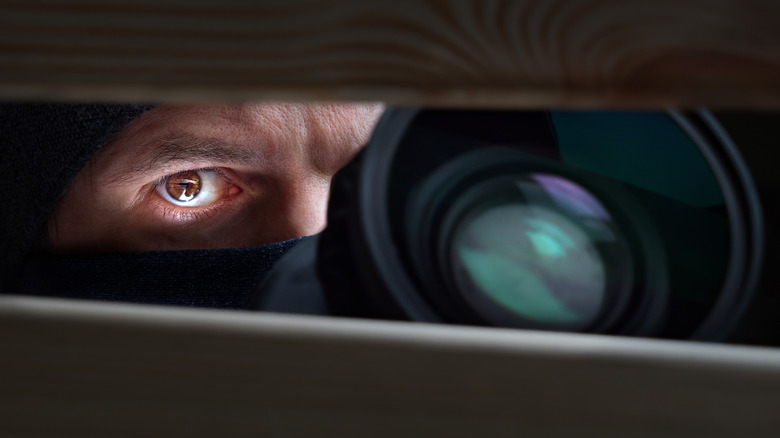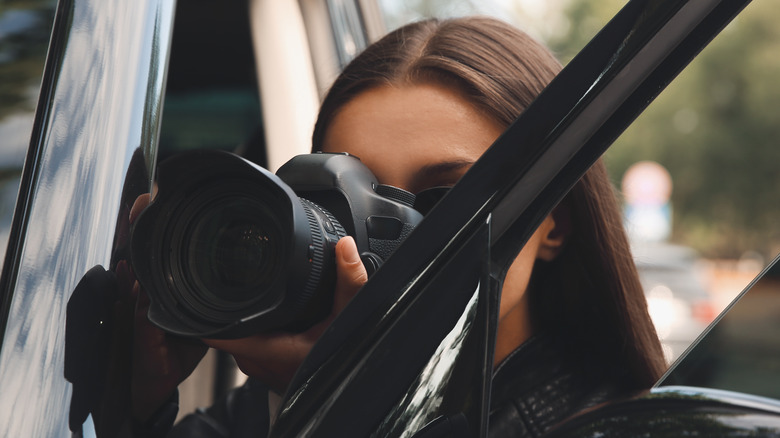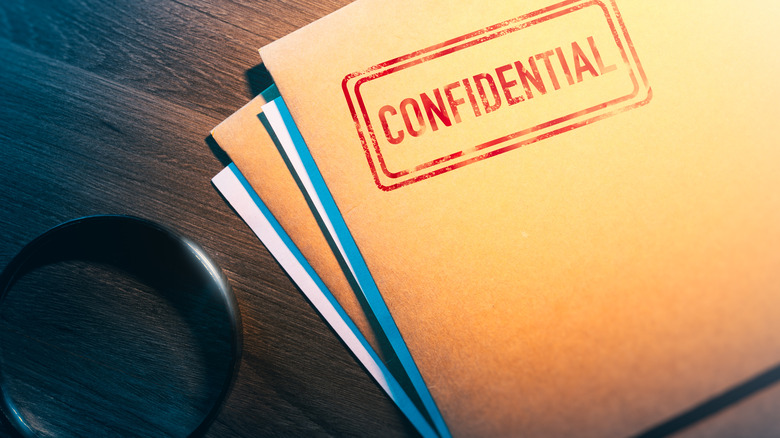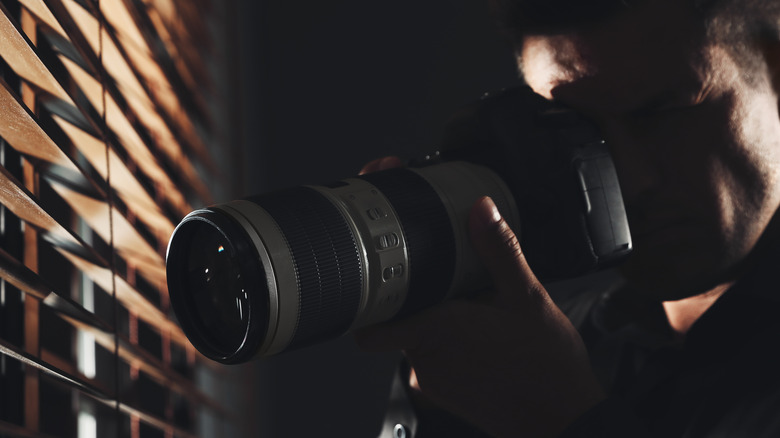What It's Really Like Being A Private Investigator
Anyone who has ever picked up a mystery thriller novel or watched a crime fiction film likely has some idea in their head about a typical day in the life of a private investigator. Such works of fiction certainly do make the everyday existence of these folks look far more exciting than the average office worker's daily drudge. After all, what could be more thrilling than getting paid to use one's wits to get to the bottom of perplexing mysteries and gather evidence against crafty ne'er-do-wells (while wearing a fedora and trenchcoat, to boot)?
The truth, however, is that the life of a private investigator isn't always as full of adrenaline highs as pop culture would have you believe. Just like the rest of us, private investigators require a certain set of skills and stick by certain guidelines, not only to be effective at what they do but also to make sure that they don't end up in jail (or worse, dead in a ditch). And just to get this out of the way: Though they refer to people engaging in almost the same work, the words "detective" and "private investigator" aren't always interchangeable. A police detective works under law enforcement, while the latter works with private individuals or corporations (via the Grand Canyon University). Following these definitions, Sonny Crockett from "Miami Vice" is an example of a police detective, while Sherlock Holmes is a private investigator.
Ever dreamed of being a private investigator yourself? Here's what it's really like.
They don't need a college degree, but having the right one helps
Given that being a private investigator requires a particular set of competencies, you may be wondering if there's a specific college degree that would help you prepare for the job. That said, depending on the kind of private investigator you want to be, you might not even need a bachelor's degree in the first place.
According to the U.S. Bureau of Labor Statistics, a high school diploma and a few years' worth of experience in the field are the usual requirements for a private eye, although a license is a must in most U.S. states. However, if you want to specialize in a particular field of work as an investigator, you'll need a degree in a 2-year or 4-year course. For example, a person aiming to become a corporate investigator needs a bachelor's (or even master's) degree in law or business administration (via All Criminal Justice Schools). Plus, if they get hired for the job by a large firm, they'll likely receive additional training in business, finance, and management.
There's no single "correct" choice for a private investigator's college degree. Chron offers four suggestions: Business (to gain the ability to spot fraudulent transactions or shady entrepreneurial practices), Computer Forensics (to help you sniff out clues from your targets' technology-related activities), Political Science (to develop an eye for unethical behavior and better understand legal and judiciary systems), and Criminal Justice or Criminology (for obvious reasons).
Private investigators (usually) need a license
Though there isn't a specific educational route through which one has to pass in order to become a private investigator, pursuing professional work in the field takes more than just having a knack for mysteries and a handy-dandy notebook, at least in the United States.
In order to actually earn a living from this line of work, private investigators in nearly all of the U.S. states should obtain a license first, according to the U.S. Bureau of Labor Statistics. Additionally, the license required for a stateside private eye isn't one-size-fits-all. Depending on where you're located and how often the laws change in each of the states, any private investigator seeking to operate legitimately needs to abide by the particular licensing laws of the state. That's because, in over 40 U.S. states, laws dictate who can and can't operate legally as a private investigator, and not all of them have the same requirements (via CrimeReads). According to Pursuit Magazine's list of updated private eye license requirements, as of 2022, states like Alaska and Wyoming don't require private investigators to have a license, but they do need to have at least a business license in most cases (i.e. certain cities in said states).
An aspiring professional private eye also has the option to get certified, which isn't necessary but can be a big boon in getting potential clients to actually trust you (per the U.S. Bureau of Labor Statistics).
They have to be familiar and up-to-date with the law
Obviously, real-life private eye work doesn't always look like how it does on TV and in movies. After all, how many times have such productions shown investigators resorting to cleverly underhanded ways to obtain evidence or catch suspects red-handed, or even tackle criminals themselves? Unfortunately, such reckless behavior would not only render the private investigator's work useless but also earn them a hefty fine (or even land them in jail).
As the U.S. Bureau of Labor Statistics states, investigators don't have the same authority as cops. In other words, they're pretty much just deeply concerned private citizens, as far as the law's concerned. That's why a private investigator has to have an updated, working knowledge of the law, per local, federal, and state jurisdictions. It's not difficult to imagine how a private eye who doesn't know the legal limitations of what they can do can easily, unwittingly violate someone's privacy rights and land themself in some serious trouble.
Robert Mullins, a University of Washington Professional and Continuing Education instructor and an investigator from Bellingham, explains that in this line of work, understanding the intricacies of civil and criminal court systems is a must. "There are a great many ways you can end up in violation of the Fair Credit Reporting Act or run up against the right to privacy."
Private investigators have to be technologically adept
Back in the day, private investigators only had their smarts, senses, and scribbles to rely on when they were trying to solve a case. However, with man's steady march toward scientific progress over the decades, being a private eye has become a more sophisticated affair — and rightly so, because crime has also taken things a few notches higher, thanks to today's technology.
As any good private eye would tell you, being adept at gadgets and software can be tremendously helpful in gathering data and evidence. For example, advanced camera technology can make modern-day surveillance a breeze (via the U.S. Bureau of Labor Statistics). It has also become considerably easier to find people through their internet activity, as virtually anything a person does online leaves digital tracks that a tech-savvy gumshoe can easily follow.
O*NET Online lists down some of the technology-related competencies that a good private investigator should hone. In addition to everyday basics (such as having email access, understanding how to use web browsers, and being able to work with word processing, presentation, and spreadsheet software), it would also help a private eye's career to learn how to use photo imaging or editing software, how to navigate digital databases, and how to create and edit simple web pages. They should also have at least some level of familiarity with the functionalities of commercially available operating systems.
They deal with a vast assortment of clients
Part of what can make a private investigator's work truly rewarding (or irritating) is the kind of clients they deal with on a regular basis. The U.S. Bureau of Labor Statistics even highlights "communication skills" and "resourcefulness" as essential traits of a private eye for this reason. Aside from knowing how to properly talk to people and phrase questions, they also need to be good at "reading" people and working with whatever limited information they can obtain from their clients or over the course of their investigation.
In an excerpt from his book "How to Start a Private Investigation Business: A Proven Blueprint for Success," Lynx Security Group founder Edward Panico enumerates 14 kinds of clients a private investigator may encounter (via Pursuit Magazine). The Adventurer, for example, likes getting involved in the investigation (a big no-no) because they think that what they see in pop culture is an accurate representation of reality, while the Cheapskate may or may not hire you depending on how much you charge them. Meanwhile, the Miracle Seeker provides the barest of information about the case, expecting that you can pull off a Hail Mary and deliver exactly what they need. Some clients will just waste your time, booking meetings they don't attend or seeking sympathy from you instead of solutions. Lastly, it's in your best interests to avoid Troublemakers (people who hire you to commit a crime, simply put).
Private investigators have a wide variety of jobs, including unsavory ones
Being a private investigator typically means getting used to accepting a wide variety of assignments. While this does necessitate developing more skills (and increased patience), it also means that the job as a whole rarely gets stale for an extended period of time.
Some of the standard tasks a private investigator performs (via the U.S. Bureau of Labor Statistics) include background verification through personal interviews, searching for missing persons, following the digital tracks of cyber-criminals, looking into public and court records, collecting evidence of a spouse's infidelity, investigating possible theft or fraud within a company, and plain old surveillance. In an interview with OK! Magazine, 54-year-old private investigator Ali Marsh shared some details about one of the first cases she ever handled: a cheating wife. According to Marsh, the man became suspicious after noticing that every week, his wife would go out and come home considerably happier. "I started some surveillance, watching her coming and going for a few Wednesdays. I noticed that her next-door neighbor was also going out at the same time on a Wednesday. I followed him and soon discovered they were having an affair."
And then there are truly unsavory, downright deplorable assignments that some private investigators with questionable morals have no qualms accepting. According to a 2019 Insider article, convicted sex offender Jeffrey Epstein reportedly hired "at least three private investigators to intimidate accusers and witnesses." Allegedly, they harassed prosecutors as well.
The job can sometimes be incredibly boring
Despite the assortment of exciting tasks (and trouble) a private investigator can get themself into, there will understandably be times when things just slow to a crawl. As the U.S. Bureau of Labor Statistics emphasizes, patience is most certainly a virtue for private investigators, because they "may have to spend long periods conducting surveillance while waiting for an event to occur" and because investigations "may not provide a resolution quickly — or at all."
According to Miss A.M Investigations director Ali Marsh (via OK! Magazine), the typical depiction of surveillance jobs in TV shows and movies couldn't be further from the truth. For starters, surveillance work almost always means following someone around on your own, with no partner to bounce ideas off of or make small talk with. You might be tempted to pop in some earphones and listen to some choice songs to keep yourself awake, but that's not such a smart move, either. You can't even check your smartphone or stretch your legs, because you might miss something important (or worse, your target might spot you). "I once had to dodge behind a bush with my camera to avoid someone I was trying to catch in the act," Marsh recalls. "That's the closest I've come to being caught out." And of course, pee breaks are out of the question.
Private investigators have an unpredictable schedule
For people who like to have a well-defined working schedule, the life of a private investigator may not suit them at all. That's because the schedule of a private eye can change in the blink of an eye, depending on the assignment they've decided to take on.
As the U.S. Bureau of Labor Statistics puts it, "it's hard to nail down a specific window of working hours when you're a private investigator." For example, if your task involves following someone around to determine whether or not they're cheating on their partner, you should expect to be on assignment even long after the average 9-to-5 employee calls it a day. And if you're trying to track down a criminal that's running away from the law, you'll be lugging your camera around with you, taking pictures of your target wherever they go while making sure they don't spot you (via Chron).
Moreover, you can't really choose what time of day you'll be working. For some assignments, you'll likely have to wake up early, while for others, you'll be up burning the midnight oil, often for nights in a row. Oh, and forget about going home for the holidays.
They don't always work alone
While tasks like surveillance work or background checking can make a private investigator's life a lonesome one, they don't always have to work alone. On occasions where the job calls for it, private eyes may find themselves working with the cops or even their fellow PIs (per the U.S. Bureau of Labor Statistics).
According to the experts at Beau Dietl & Associates, the reasons why police don't always find the need to work with private investigators is because 1) law enforcement has its own investigators and 2) police investigators and private investigators tend to have different wheelhouses. A private investigator's efforts typically revolve around standard information-gathering for clients, which is usually "not in the criminal space." On the other hand, a police investigator looks into cases with the intent of gathering evidence to pinpoint the perpetrator's identity or acquire proof of guilt beyond a reasonable doubt.
As for private eyes pooling their efforts to accomplish a single assignment, the professionals at Kinsey Investigations state that it's actually not that rare. At times, two or three private investigators may band together, sharing information, resources, and modes of transportation to crack particularly difficult cases.
There is plenty of writing and research involved
Based on how private investigators are typically portrayed in pop culture, one can probably imagine their offices to be full of stacks of paper and piles of folders. While this tends to be exaggerated for dramatic effect in such portrayals, real-life private eyes frequently have to contend with an astounding amount of (literal and digital) paperwork, both in terms of reading and writing.
According to O*NET Online, it's part of a private investigator's job to write investigation reports, case summaries, or incident reports, whether for legal compliance or for submitting to their clients. When they record information (such as interviews), private eyes also need to transcribe them, both for easier perusal and to ensure that they have a backup of the data. Additionally, they'd need to organize all the information they obtain when investigating embezzlement, fraudulent claims, or other possible criminal activity. Math skills are also a must for private investigators in the business and finance space, because their work involves a lot of transaction reviews and receipt-checking.
There's also the matter of private investigators having to keep their own records organized. With the sheer number of cases they work on during their careers, there's no doubt that they need some way to keep track of everything, largely for legal compliance.
The job can sometimes be dangerous
Now, you might be wondering, "Just how dangerous is the life of a private investigator?"
In a 2015 interview with The Guardian, private investigator Richard Martinez shared some of his experiences throughout his professional career. Calling the job "exciting and unpredictable," Martinez admitted that he gets immense satisfaction not just from solving a case, but also from the process of finding evidence. However, this has at times led him to danger. Once, he found himself being interrogated by a gang, relying only on his communication skills to make it out of that situation in one piece. By Martinez's count, one in 10 assignments "gets a bit hairy," though he said that it's typically because of where and when the legwork takes place (e.g., during nighttime in a notoriously crime-filled area) as opposed to the actual nature of the work. There were also a couple of instances in which his attempts at staying incognito during an assignment failed because a customer "[left his] business card out on the table." According to Martinez, a private investigator shouldn't be easily scared or disgusted. "Some of the locations you will be in can be a bit hair-raising for the average person."
Admittedly, an assignment like pre-employment verification is considerably less risky than, say, trying to find a potential kidnap victim (via Indeed). Still, if you don't want a career that may be full of stress, the life of a private investigator, regardless of specialty, might not be for you.
There are a lot of opportunities, thank to a high demand
One might think that the age of private investigators is over, given how much information is at the fingertips of anyone with internet connectivity. That said, you may be surprised to learn that the private investigation realm is actually a booming industry — and by the estimates of the U.S. Bureau of Labor Statistics, opportunities are expected to increase significantly within the next 10 years.
Each year, the bureau anticipates an additional 3,500 job opportunities for private investigators. In 2020, the bureau pegged employment of private investigators at 33,700. By 2030, this number could swell to 38,100, a growth rate of 13%.
Oh, and the profession pays fairly well, too. Per 2021 statistics, the median pay for a private investigator was nearly $29 per hour, or almost $60,000 a year. According to CrimeReads, a private investigator can take on assignments to catch cheating spouses in the act at an hourly rate of at least $50. If the parties involved are members of high society, the rate can be exponentially higher — up to half a million dollars, even.












